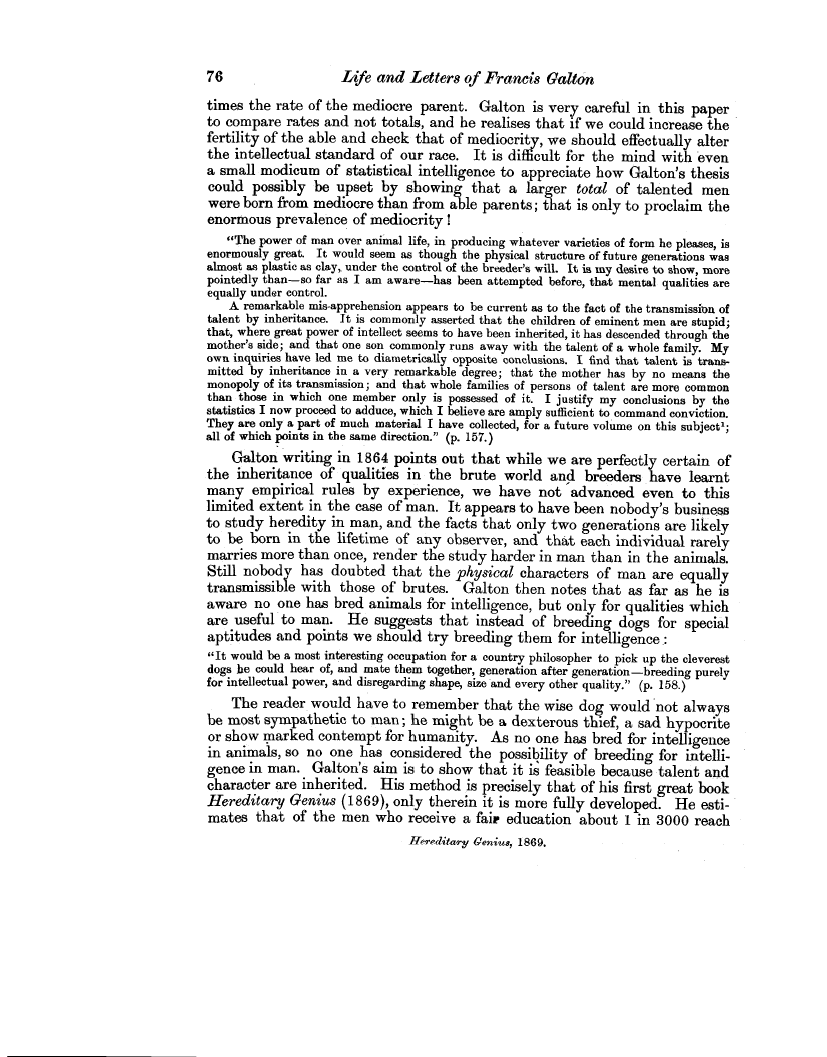76 Life and Letters of Francis Galton
times the rate of the mediocre parent. Galton is very careful in this paper to compare rates and not totals, and he realises that if we could increase the fertility of the able and check that of mediocrity, we should effectually alter the intellectual standard of our race. It is difficult for the mind with even a small modicum of statistical intelligence to appreciate how Galton's thesis could possibly be upset by showing that a larger total of talented men were born from mediocre than from able parents; that is only to proclaim the enormous prevalence of mediocrity !
"The power of man over animal life, in producing whatever varieties of form he pleases, is enormously great. It would seem as though the physical structure of future generations was almost as plastic as clay,. under the control of the breeder's will. It is my desire to show, more pointedly than-so far as I am aware-has been attempted before, that mental qualities are equally under control.
A remarkable mis-apprehension appears to be current as to the fact of the transmission of talent by inheritance. It is commonly asserted that the children of eminent men are stupid; that, where great power of intellect seems to have been inherited, it has descended through the mother's side; and that one son commonly runs away with the talent of a whole family. My own inquiries have led me to diametrically opposite conclusions. I find that talent is transmitted by inheritance in a very remarkable degree; that the mother has by no means the monopoly of its transmission; and that whole families of persons of talent are more common than those in which one member only is possessed of it. I justify my conclusions by the statistics I now proceed to adduce, which I believe are amply sufficient to command conviction. They are only a part of much material I have collected, for a future volume on this subject';
all of which points in the same direction." (p. 157.)
Galton writing in 1864 points out that while we are perfectly certain of the inheritance of qualities in the brute world and breeders have learnt many empirical rules by experience, we have not advanced even to this limited extent in the case of man. It appears to have been nobody's business to study heredity in man, and the facts that only two generations are likely to be born in the lifetime of any observer, and that each individual rarely marries more than once, render the study harder in man than in the animals. Still nobody has doubted that the physical characters of man are equally transmissible with those of brutes. Galton then notes that as far as he is aware no one has bred animals for intelligence, but only for qualities which are useful to man. He suggests that instead of breeding dogs for special aptitudes and points we should try breeding them for intelligence
"It would be a most interesting occupation for a country philosopher to pick up the cleverest dogs be could hear of, and mate them together, generation after generation-breeding purely for intellectual power, and disregarding shape, size and every other quality." (p. 158.)
The reader would have to remember that the wise dog would not always be most sympathetic to man ; he might be a dexterous thief, a sad hypocrite or show marked contempt for humanity. As no one has bred for intelligence in animals, so no one has considered the possibility of breeding for intelligence in man. Galton's aim is to show that it is feasible because talent and character are inherited. His method is precisely that of his first great book Hereditary Genius (1869), only therein it is more fully developed. He estimates that of the men who receive a fair education about 1 in 3000 reach
Hereditary Genius, 1869.

